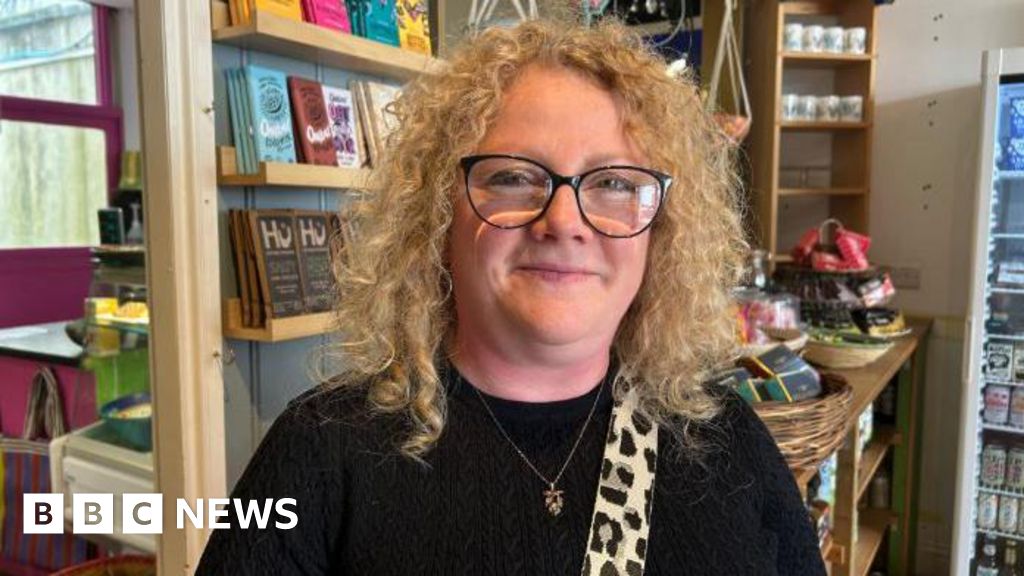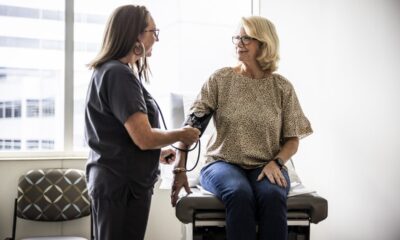Health
Wales Introduces Cash Cards for Gluten-Free Food Aid

People in Wales with gluten intolerance will soon receive debit-style cash cards preloaded with funds to assist in purchasing gluten-free food. This innovative approach, set to launch later in 2023, marks the first of its kind in the UK, offering a significant alternative to the existing prescription model. Currently, individuals diagnosed with conditions such as coeliac disease, which affects approximately one in 100 people, obtain gluten-free food through prescriptions from pharmacies.
Cherylee Barker, a 54-year-old coeliac from Narberth, Pembrokeshire, participated in a pilot scheme, receiving £14 monthly. She remarked that this amount merely “scratches the surface” of the overall costs associated with maintaining a gluten-free diet. A report from Coeliac UK indicated that adhering to a gluten-free diet can increase food expenses by as much as 35%. The Welsh government, represented by Health Minister Jeremy Miles, aims to “de-medicalise the supply of gluten-free foods,” providing greater flexibility for those affected.
The new cash cards will function similarly to a chip and PIN bank card and will be accepted at various outlets, including supermarkets, shops, community pharmacies, and online retailers. While the Welsh government has not disclosed the exact amount each person will receive, they have indicated that it will vary based on individual needs and be subject to regular reviews. Officials anticipate that the initiative will be “cost neutral,” ensuring it does not place additional strain on the National Health Service (NHS) budget.
Despite the introduction of the cash card system, the prescription model will remain available in Wales, following similar frameworks in England, Scotland, and Northern Ireland. Coeliac disease, an autoimmune condition, renders individuals incapable of digesting gluten, leading to symptoms such as bloating, vomiting, and diarrhea. The increased costs associated with gluten-free products are notable; for example, the average price of a standard loaf of bread is around 63p, while its gluten-free counterpart can reach prices of £2.26. Similarly, a standard penne pasta costs an average of 56p per 500g, whereas the cheapest gluten-free option averages £1.22.
Ms. Barker, who has been part of the pilot programme in the Hywel Dda health board area for five years, expressed her views on the previous prescription system, describing it as “slightly embarrassing” and the food options as “not that edible.” She noted, “I didn’t want to take the money from the NHS. I thought ‘just suck it up and see,’ but after a little while I just found it was just becoming more and more expensive. It isn’t a lifestyle choice; it is a need.” Despite her enthusiasm for the new cash card initiative, she emphasized that the amount provided remains insufficient given the rising costs faced by coeliacs.
Another participant, Bethan Williams, a 24-year-old from Cardiff, echoed similar sentiments about the limitations of the prescription system, citing the low quality of available food. As a vegetarian, she sees the cash cards as a means to empower individuals with dietary restrictions to make healthier choices. “Eating food and being able to eat a balanced diet isn’t a privilege; it’s something everyone should be entitled to,” she stated.
Local businesses, such as Plumvanilla Cafe and Deli in Narberth, which will accept the new cash card, are also adapting to meet the community’s gluten-free needs. Gemma Beere, a staff member at the cafe, noted a growing number of shoppers with gluten-free requirements and the challenge of balancing stock with the high cost of gluten-free items to minimize waste.
Minister Miles highlighted that the initiative aims to reduce “administrative burdens on GPs and pharmacies.” He reiterated the importance of recognizing that for individuals with coeliac disease, following a strict gluten-free diet is essential for their health. “We want to de-medicalise the supply of gluten-free foods in Wales, giving people more freedom to access the food they want to eat, more conveniently, to help them manage their condition,” he stated.
Tristen Humphreys from Coeliac UK emphasized the significance of acknowledging that a gluten-free diet is not merely a lifestyle choice but a medical necessity for many. He advocated for supporting these dietary needs as a means to prevent future health complications, describing it as a “cost-efficient” approach for the NHS. Humphreys called on other regions in the UK to consider similar measures to assist those affected by coeliac disease.
The introduction of cash cards for gluten-free food in Wales represents a notable shift in how dietary needs are addressed, potentially improving access and quality for individuals reliant on gluten-free diets.
-

 Entertainment3 months ago
Entertainment3 months agoAnn Ming Reflects on ITV’s ‘I Fought the Law’ Drama
-

 Entertainment4 months ago
Entertainment4 months agoKate Garraway Sells £2 Million Home Amid Financial Struggles
-

 Health3 months ago
Health3 months agoKatie Price Faces New Health Concerns After Cancer Symptoms Resurface
-

 Entertainment3 months ago
Entertainment3 months agoCoronation Street’s Carl Webster Faces Trouble with New Affairs
-

 Entertainment3 months ago
Entertainment3 months agoWhere is Tinder Swindler Simon Leviev? Latest Updates Revealed
-

 Entertainment4 months ago
Entertainment4 months agoMarkiplier Addresses AI Controversy During Livestream Response
-

 World2 weeks ago
World2 weeks agoBailey Announces Heartbreaking Split from Rebecca After Reunion
-

 Science1 month ago
Science1 month agoBrian Cox Addresses Claims of Alien Probe in 3I/ATLAS Discovery
-

 Health4 months ago
Health4 months agoCarol Vorderman Reflects on Health Scare and Family Support
-

 Entertainment2 weeks ago
Entertainment2 weeks agoCoronation Street Fans React as Todd Faces Heartbreaking Choice
-

 Entertainment4 months ago
Entertainment4 months agoKim Cattrall Posts Cryptic Message After HBO’s Sequel Cancellation
-

 Entertainment3 months ago
Entertainment3 months agoOlivia Attwood Opens Up About Fallout with Former Best Friend





















